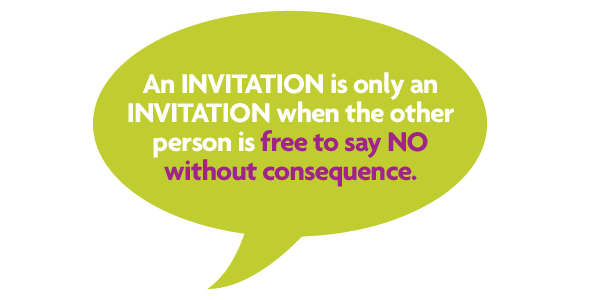It’s Unsolicited Advice Week! A.k.a Thanksgiving.

You may be looking forward to seeing your family this weekend, but may not be looking forward to their inquiries and advice about the status of your life.
Unsolicited feedback is often unwelcome. Most people are more open to hearing another’s point of view when she asked us if she can share it first.
If your family starts to pry or give unsolicited feedback, there are a few things you can do.
- Thank them for caring. Then tell them that you’re really trying not to think about ______ (insert topic). And ask if you can talk about something else.
Or…
- Thank them for caring, and tell them that you aren’t looking for advice about _____ (insert topic). Again, you appreciate their concern and will come to them for guidance, when that’s what you want.
The people in your life care about you. They want to make a difference. Chances are they are not even aware they’re giving unsolicited advice. Many people give advice so automatically, they don’t even know they’re doing it.
Things not to do:
Don’t apologize for not wanting to talk about a subject or for rejecting unsolicited advice. Unless you’ve been rude or mean spirited in your communication, you have nothing to apologize for.
You could consider trying to prevent unsolicited advice by setting expectations before awkward conversations happen. Tell your family and friends that you are excited to see them, but don’t want to talk about _______ (insert job, spouse, speeding tickets, weight loss, or whatever ails you). Or, tell them that you do want to share what’s happening with (insert situation) but are not looking for advice. Tell your family and friends, if they can resist the temptation to tell you what to do, you’ll be happy to give them an update.
Here are a few sample scripts:
“Thanks so much for being concerned about my career. I really appreciate it. I’m not looking for advice right now, but if I want to talk about it, I’ll let you know. Thanks again for being concerned.”
Yes, you really can say this.
Here’s another one: “Thanks so much for being concerned about me. I know you want me to be happy and only want what’s best for me. I don’t really want to talk about my relationship with Lisa/Bob. But again, I really appreciate your concern.”
Yes, you can really say that too.
If you want more sample language, there are many more examples in my new book. And in honor of unsolicited advice week (a.k.a. Thanksgiving), we’re having a buy one-get-one free special. Maybe your mom will read the book!!

You may be concerned that speaking up will damage the relationship and decide it’s easier to say nothing. But the relationship is damaged anyway. When we avoid people or are afraid to say what we really think, our relationships need work. So why not speak up, make a request, and see if things get better?
If you have a tendency to give unsolicited advice, catch yourself. Try this instead, “I’ve been thinking about your desire to break into a new field work wise. I have a couple of ideas. Do you want to talk about it?”
Or, “I’ve been thinking about your relationship with Joe/Suzanne. You mentioned it’s been a struggle of late. Do you want to talk about it?”
Then let the person say no. If you’re going to make a conversation available, it must be ok to say no! If the person can’t say no without offending you or damaging your relationship, you’ve made a demand, not a request.

Make your holiday less stressful and more fun by telling the truth. If it goes badly, you can blame me. Be sure to call and tell me, so I can write about you next week. I’ll ask for your permission before I do it!




